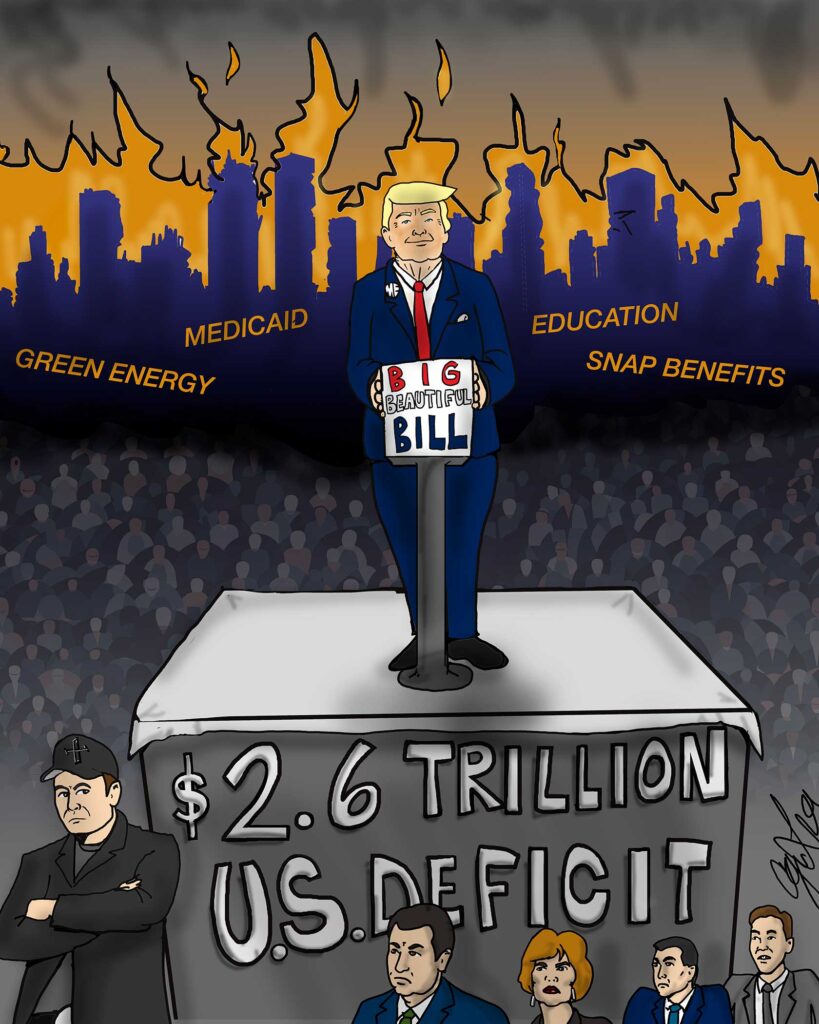
When Elon Musk called President Donald Trump’s “Big Beautiful Bill” a “disgusting abomination,” he was right for the wrong reasons. Musk, America’s corporate welfare poster boy, focused on the White House budget bill’s pork-barrel spending and its impact on deficits. “This immense level of overspending will drive America into debt slavery!” the billionaire wrote on X, noting it would “massively increase the already gigantic budget deficit to $2.5 trillion.”
Boosting U.S. debt to a level where annual interest payments exceed national defense spending and drive up the cost of borrowing for homes, autos and household expenses is certainly concerning. Never mind that Musk, recently ushered out of the White House after his damaging DOGE stint as Chainsaw Elon, is probably also peeved at Trumpian plans to eliminate the electrical vehicle subsidies so important to his tanking automaker Tesla.
What Musk and other deficit hawks ignore is the human cost of the Trump budget, which reaches into every aspect of life facing struggling families in America today — from housing and health care to childcare, education, and nutrition. The centerpiece of the bill is a massive reverse Robin Hood giveaway to the nation’s wealthiest income earners and big businesses, who will line their pockets and buy back stocks rather than invest the windfall in their workers or enterprises.
According to the Center for Budget Priorities, the top 1% of earners will get a $70,000 income boost in the first year alone. Estimates from the Penn Wharton and the Congressional Budget Office say that the bill will reduce the take-home incomes of the bottom 10 percent of income-earner by 4% by the end of the decade and leave most households earning less than $51,000 with an after-tax income decrease. To partially pay for the unholy mess — which includes increased funding for border patrols and deportation stormtroopers — Trump cuts deeply into social spending, putting families at risk.
Medicaid, the federal health insurance program for the poor that splits costs between states and the federal government, would see an $800 million reduction in support over 10 years. Of the 71 million people currently getting health care through Medicaid, as many as 10 million could lose coverage through a series of cuts and policy changes. The stakes are enormous. Black and brown Americans make up 31% of the U.S. population but close to half of all Medicaid enrollees. One of the most onerous proposed policy changes is the introduction of work requirements for able-bodied recipients under the age of 65 – 64% of whom are already working full or part time. Reporting requirements to verify 80 hours of work or volunteer activity per month have shown in the past to be cumbersome, expensive and ineffective. They’ve ultimately resulted in reductions in Medicaid enrollees – which is the cynically hidden goal at the heart of the change.
The Trump bill would cut federal support for housing by 44%, devastating programs to address affordable housing, homelessness and community development programs. Under the guise of giving states more autonomy in federal spending, U.S. Department of Housing and Urban Development rental assistance initiatives would be lumped together in block grants, with a total allocation reduction of $26.7 billion. Section 8 housing vouchers for projects and individual tenants would be at risk. Support for senior housing and housing for people with disabilities would shrink. According to the National Low Income Housing Coalition, the impact on some 4.4 million of the country’s poorest households would result in rising homelessness and social instability.
On the schools front, Trump’s efforts to eliminate the U.S. Department of Education take place while proposing a $4.5 billion cut to federal K-12 programs and close to $8 billion in reductions to higher education support and other programs, including civil rights enforcement, student safety, and workforce training. Streamlining funding to fit into block grants where states decide on spending allocations would reduce accountability and make it easier to slash budgets further down the road. While Head Start has been spared from total elimination in the budget, some sites have already had to close their doors because of claw-backs from previously authorized appropriations. Meanwhile, the Trump budget does limit the availability of the child tax credit to citizen children with a citizen parent.
While cutting as much as $300 billion in nutritional aid to low-income families, Trump would also impose work requirements on recipients of the Supplemental Nutrition Assistance Program. These cuts, the largest in history to what was formerly known as food stamps, would place millions of children at risk, take food away from millions of poor adults and increase poverty and hardship in America.
In Trump world, struggling families who can’t afford to keep the thermostat up in cold winters will no longer receive fuel subsidies as the Low-Income Home Energy Assistance Program would be eliminated. Households that choose to buy food and pay for medicine rather than pay for heat often turn to dangerous methods to stay warm, like open stoves or space heaters.
The administration’s comprehensive war on the poor is bad enough but the White House also tries to insulate itself from legal consequences by a provision, slipped into the budget bill by the House, to block any funding to enforce contempt of court orders.
By now, America is accustomed to Trump’s practice of “flooding the zone” with outrageous statements and executive actions, thereby overwhelming critics and opponents unable to keep up an effective defense of American values and principles. But the negative press over the harmful consequences of Trump’s tariffs on the economy and household budgets and the cruel impact of his proposed budget invited a White House countermove. So, it was no surprise to hear Trump’s creepy domestic policy aide, Stephen Miller, saying that the best way to restore law and order in the wake of ICE protests in Los Angeles was to pass the budget bill.
Don’t believe the hype. Trump’s “Big Beautiful Bill” is bad for America. We hope there are enough fiscally sane and morally sound U.S. senators to reject the narrowly passed House version of the budget and produce a compromise bill that doesn’t eviscerate our national safety net at a time when we most need it.
Ronald Mitchell
Editor and Publisher, Bay State Banner








Leave a Reply
You must be logged in to post a comment.